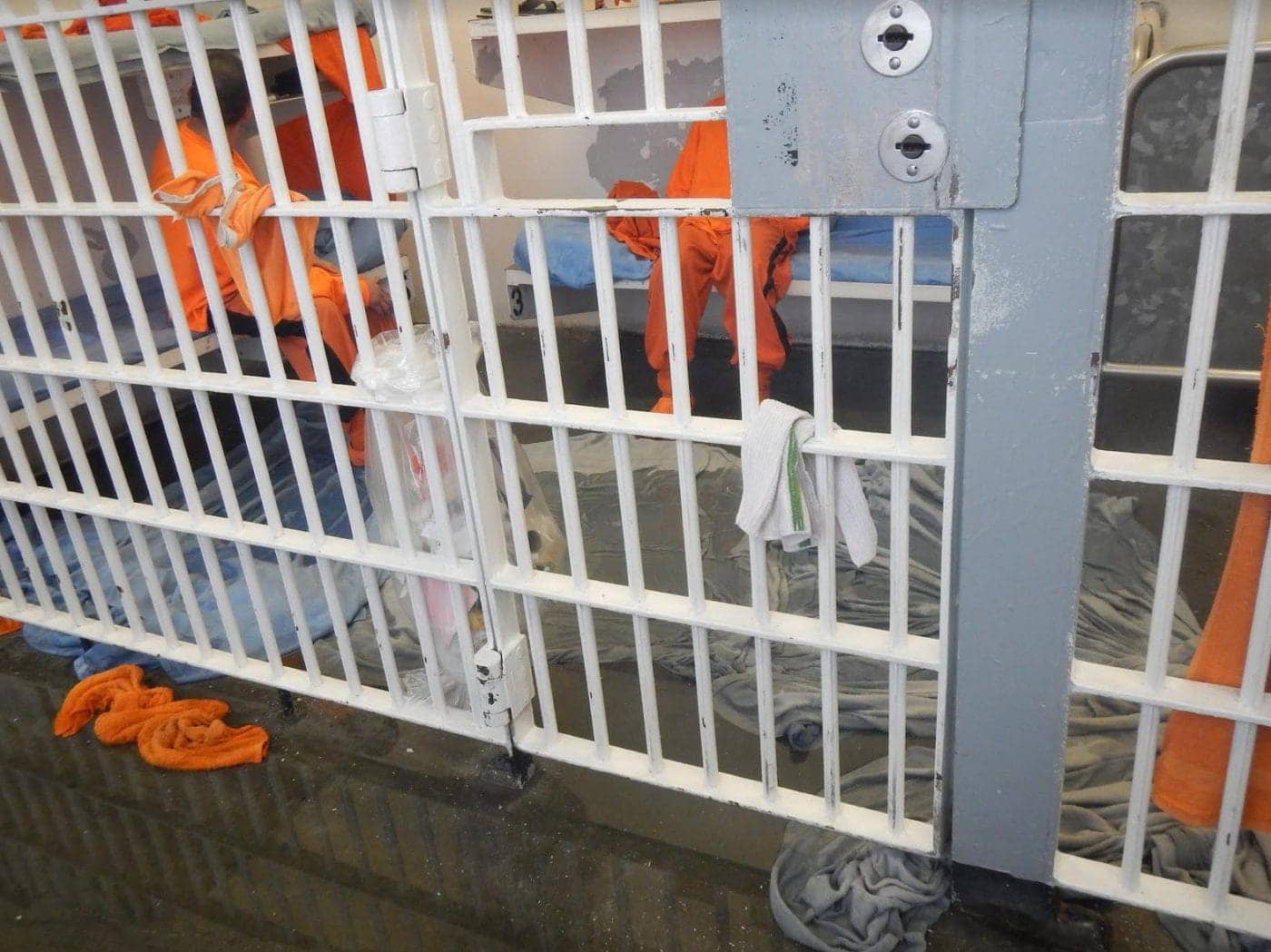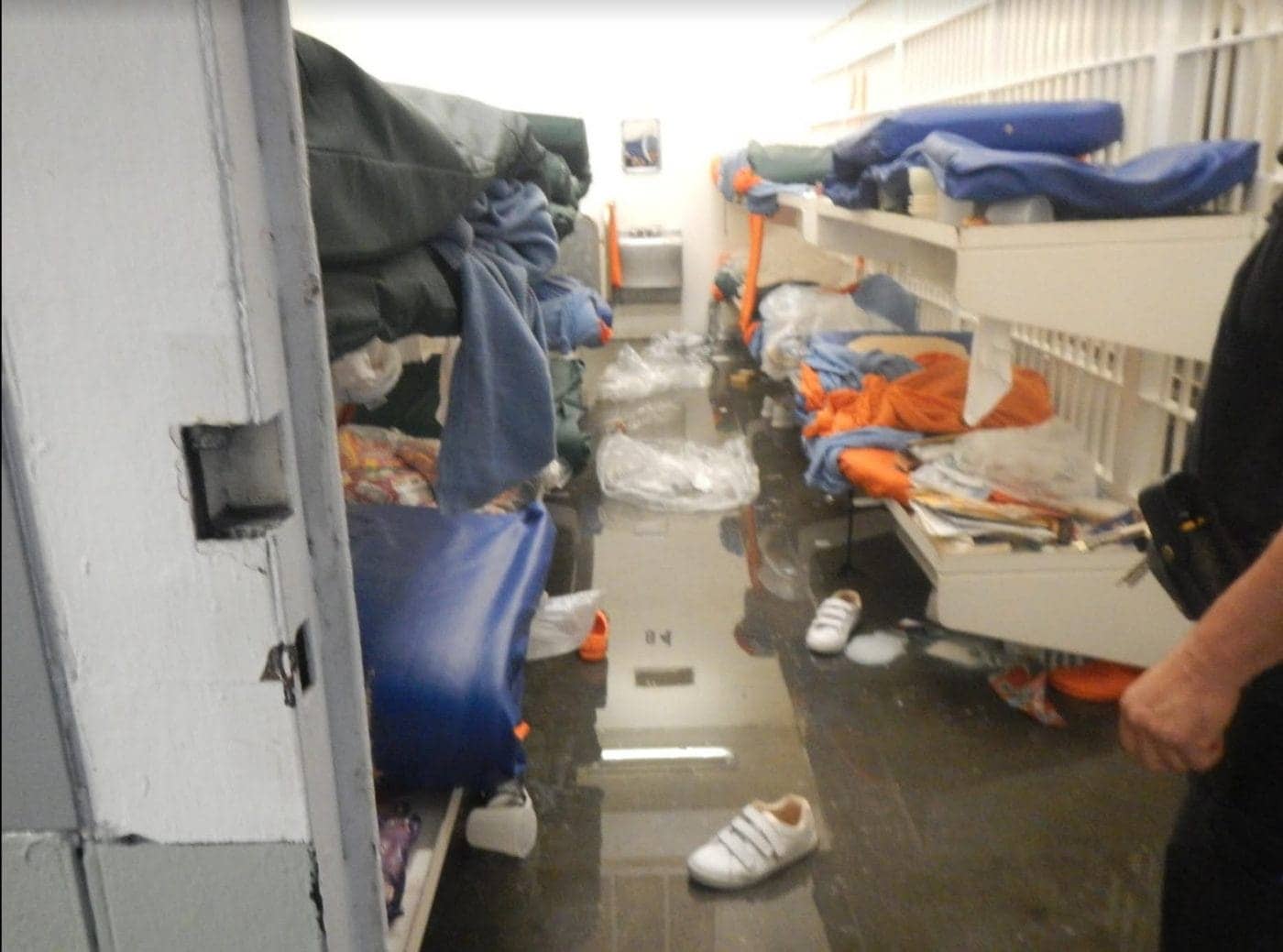
by Mohamed Shehk, No New SF Jail Coalition
San Francisco – Over 50 service, legal and community organizations have signed a letter to San Francisco’s elected officials demanding that the city release prisoners to mitigate the spread of COVID-19 inside of jails and urges measures that would reduce people’s contact with the criminal legal system. The letter has been sent to San Francisco Sheriff Miyamoto, Presiding Judge Wong, Mayor Breed, District Attorney Boudin, and all members of the Board of Supervisors.
The statement reads, “As both health and criminal justice experts have noted, carceral settings, including prisons, jails and detention centers, are known incubators of infectious diseases. Additionally, incarcerated people have an inherently limited ability to fight the spread of infectious disease: they are confined in close quarters and cannot avoid contact with people who may have been exposed, especially when testing is not prioritized or accessible … The proven and most effective way to combat the spread of infectious diseases inside of jails is to reduce the imprisoned population and release people back into their communities.”
The No New Jail Coalition is monitoring the situation inside of the jails closely, and will be following up with elected officials about the mitigating steps next week.
Mitigating the spread of COVID-19 in the SF county jails and criminal legal system
The following open letter dated March 19, 2020, was sent by email to San Francisco County Sheriff Paul M. Miyamoto, San Francisco County Superior Court Presiding Judge Garret L. Wong, San Francisco County District Attorney Chesa Boudin, San Francisco Mayor London Breed, San Francisco County Board of Supervisors: Norman Yee, President, District 7; Sandra Lee Fewer, District 1; Catherine Stefani, District 2; Aaron Peskin, District 3; Gordon Mar, District 4; Dean Preston, District 5; Matt Haney, District 6; Rafael Mandelman, District 8; Hillary Ronen, District 9; Shamann Walton, District 10; Ahsha Safaí, District 11
Dear San Francisco elected officials:
The concerns around the COVID-19 pandemic have become more grave by the day. As a result of an announcement made earlier this week, six Bay Area counties have begun to “shelter in place.” This follows the federal administration’s declaration of a national emergency earlier this month. We are seeing the numbers of people contracting COVID-19 rise every day, with local governments, community organizations and residents themselves doing all they can to prepare and ensure they are equipped to endure this pandemic.
Health Affairs journal notes that our “nation’s experience with tuberculosis, HIV and the ongoing hepatitis C epidemic has taught us that correctional settings are reservoirs of infectious diseases. Prisons push people into the paths of epidemics.”
Unfortunately, we have not done nearly enough to ensure the safety, health and wellbeing of our community members who are locked in the county jails. As both health and criminal justice experts have noted, carceral settings, including prisons, jails and detention centers, are known incubators of infectious diseases.
Additionally, incarcerated people have an inherently limited ability to fight the spread of infectious disease: They are confined in close quarters and cannot avoid contact with people who may have been exposed, especially when testing is not prioritized or accessible.
For instance, the Health Affairs journal notes that our “nation’s experience with tuberculosis, HIV and the ongoing hepatitis C epidemic has taught us that correctional settings are reservoirs of infectious diseases. Prisons push people into the paths of epidemics.”
The Human Impact Partners’ Health Instead of Punishment Program has also published a national report detailing the harms of pretrial detention from a public health perspective. The San Francisco Public Defender’s Office has already detailed steps that would reduce the jail population to help mitigate COVID-19.
Thus far, one of the only measures the SF Sheriff’s Department has taken is to further disconnect imprisoned people from their family and support networks by suspending visitation to county jails. Responses such as lockdowns, placing people in solitary confinement and limiting access to visits from loved ones are punitive and ineffective responses to outbreaks.
Not only does the Sheriff’s response fail to address the fact that Sheriff’s deputies and other staff are just as likely to bring in the disease, but this shamefully cuts off imprisoned people from their loved ones during the worst public health crisis in recent memory despite its well-known harmful effects.
The proven and most effective way to combat the spread of infectious diseases inside of jails is to reduce the imprisoned population and release people back into their communities. Indeed, in California, Los Angeles and San Diego counties have already begun reducing their jail populations. In Cuyahoga County, Ohio, judges have been releasing people on bond, community service or time served.
We urge you to take immediate action to ensure the health and wellbeing of imprisoned people and to mitigate the spread of COVID-19. We trust that you will consider the following recommendations seriously.
Elder, medical, and early release. Immediately release all individuals who are 50 years old or older, are immunocompromised, and/or have underlying medical conditions that pose increased risk from a COVID-19 infection. (According to Vera Institute’s 2010 Report, titled “It’s About Time: Aging Prisoners, Increasing Costs, and Geriatric Release,” “At least 27 states have a definition for who is an ‘older prisoner,’ according to a recent survey: 15 states used 50 years as the cutoff, five states used 55, four states used 60, two states used 65 and one used age 70. Although most 50-year-olds are not considered elderly, the aging process appears to accelerate for people who are incarcerated.”)
We also urge you to implement the demands and recommendations put together by TGI Justice Project to release and care for transgender, gender nonconforming, intersex and LGBQ community members in the jails. Release all individuals who have 90 days or less remaining in their sentence, and accelerate the release of individuals with more than 90 days remaining. Release people without using electronic monitors.
Pretrial release. Immediately release all people who are held pretrial.
Release all youth from Juvenile Hall.
Free phone calls in jails. Immediately implement previously agreed upon plans to make all prisoners’ phone calls to people outside of the jail free.
Reduce police contact with community. Immediately suspend quality of life policing, the patrolling and sweeps of houseless community members, and the re-arrest and booking of people on technical parole violations. Halt new admissions to county jails.
Cite and release. For any law enforcement contact that results in arrests, adopt cite-and-release policies whenever possible.
Halt all ICE operations. Ensure that Immigration and Customs Enforcement is not picking anyone up, especially outside of county jails.
Begin steps to close 850 Bryant St. jail without out-of-county transfers or increases to electronic monitoring. As is widely known, 850 Bryant St. is a decrepit, seismically unsafe structure, and County Jail #4 is itself a severe health hazard.

Just last month, journalist Darwin Bond Graham revealed pictures taken inside County Jail #4 during a past sewage spill, stating, “Raw sewage overflowed and soaked detainees’ belongings, forcing them to live in puddles of feces and urine-contaminated water.” Holding people in a building where such conditions are routine is unconscionable – particularly during the current pandemic.
Housing for all. Open up access to unoccupied homes for anyone who needs them, particularly for imprisoned people being released. Put an immediate moratorium on home evictions, eviction proceedings and rent enforcement.
Free healthcare and food access. Free testing, treatment, healthcare, mental healthcare and increased food access for all, particularly for imprisoned people being released.
Transparency to the public. Report to the public a plan for the implementation of the above steps no later than Wednesday, March 25, 2020.
As COVID-19 is spreading exponentially, we urge you to take action immediately. Once a case of the virus is confirmed inside, it will already be too late. The moment has called upon us to take bold and even unprecedented steps to combat this pandemic.
San Francisco has stepped up and provided strong leadership for community members across the Bay Area. Now you must do the same for those locked inside of our jails.
Sincerely,
No New SF Jail Coalition
Advancing Justice – Asian Law Caucus
All of Us or None
All of Us or None – Riverside
Alliance for Boys and Men of Color
Alliance of South Asians Taking Action
American Friends Service Committee
Anti-Police Terror Project
API Equality – Northern California
Arab Resource and Organizing Center
Asian Pacific Environmental Network
Berkeley Free Clinic
California Coalition for Women Prisoners
Californians United for a Responsible Budget
Causa Justa :: Just Cause
Coleman Advocates
Communities United Against Violence
Community Housing Partnership
Critical Resistance Oakland
Democratic Socialists of America – SF
Do No Harm Coalition
Drug Policy Alliance
Ella Baker Center
End Solitary Santa Cruz County
Flying Over Walls: Black & Pink SF Bay Area
GLIDE
Health Justice Commons
Housing Rights Committee of San Francisco
Human Impact Partners
Immigrant Legal Resource Center
Justice Teams Network
Lavender Youth Recreation and Information Center
Media Alliance
National Organization for Women California
Policy Link
Prisoner Advocacy Network
Senior & Disability Action
SF Gray Panthers
SF No Injustice Committee
SF Rising
SF Youth Commission
Starting Over, Inc.
Students for Sensible Drug Policy
TGI Justice Project
Third Traditions Foundation
Western Regional Advocacy Project
Youth Justice Coalition
Mohamed Shehk, media and communications director for Critical Resistance, a national grassroots organization working to abolish the prison industrial complex, is a spokesperson for the No New SF Jail Coalition. He can be reached at Critical Resistance, 1904 Franklin St., Suite 504, Oakland, CA 94612, 510-444-0484 or mohamed@criticalresistance.org.





